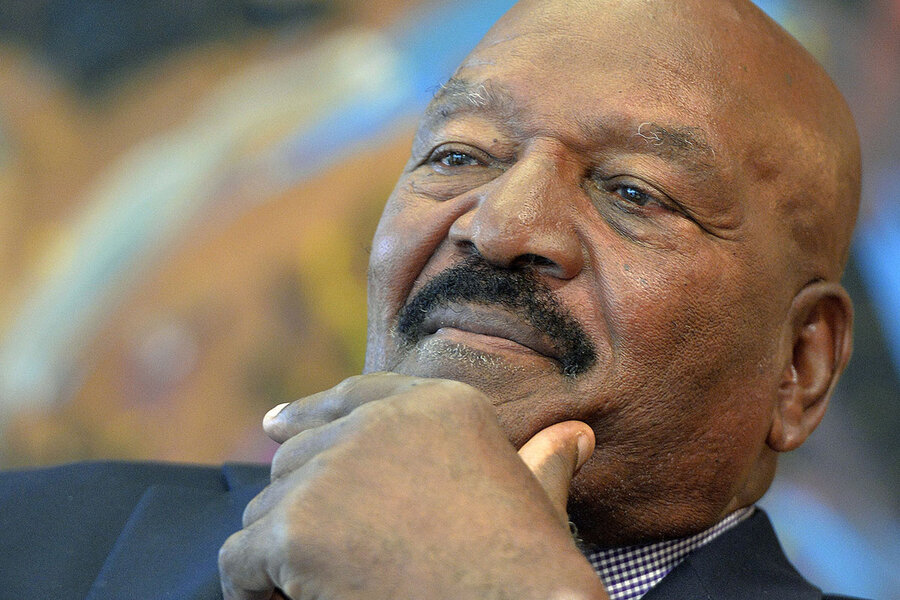Jim Brown stood for those who stood against the establishment
Loading...
In 1966, at the height of his historic football career, Jim Brown sought out Muhammad Ali to test his mettle in the boxing ring. Months later, when Ali refused to join the military, Mr. Brown sought a different kind of test.
He brought together some of the most influential Black athletes in the nation to question Ali. Bill Russell and others peppered The Greatest with questions to determine the honesty of his position. What resulted was the Cleveland Summit, one of the defining moments at the intersection of sports and activism.
Why We Wrote This
A story focused onJim Brown was the paragon of football running backs, whose athletic feats defied belief. But he saw himself, first and foremost, as a man fighting for the freedom of those around him – and himself.
Mr. Brown, who died Friday, marched his way to the record books – and over hapless opponents – as a football star for the National Football League’s Cleveland Browns. He famously retired at 30 to pursue a career in acting. His post-football career wasn’t defined by entertainment, however, but empowerment.
He was a complicated man. Allegations and admissions of abuse were well documented. But in speaking for a young athlete suing the NFL in 2003, he was also speaking for himself. “He wants to help other players. He’s told me several times that he wants to do something that is bigger than himself.”
Arguably the greatest sportsman of all time left one pastime behind during his transition from high school to college and the pros – baseball. Yet Jim Brown always went to bat for others.
Mr. Brown, who died Friday, marched his way to the record books – and over hapless opponents – as a football star at Syracuse University and the National Football League’s Cleveland Browns. Yet his legacy will be remembered as much for social justice as his athletic feats on Sunday afternoons. Throughout his life, he worked to improve economic opportunities for Black Americans and stood for the dignity of those who challenged the establishment.
All these threads came together most memorably at the Cleveland Summit, also known as the Ali Summit, in 1967.
Why We Wrote This
A story focused onJim Brown was the paragon of football running backs, whose athletic feats defied belief. But he saw himself, first and foremost, as a man fighting for the freedom of those around him – and himself.
One year prior, Mr. Brown sought out Muhammad Ali to test his mettle in the ring. Months later, when Ali refused to join the military, Mr. Brown brought together some of the most influential Black athletes in the nation to question him, including Bill Russell and Lew Alcindor (who would later change his name to Kareem Abdul-Jabbar). They peppered The Greatest with questions to determine the honesty of his position. What resulted was one of the defining moments at the intersection of sports and activism.
“We had the same attitude about who we were,” Mr. Brown said in a 2014 interview with Larry King. “[Ali and I] never accepted second-class citizenship, and we made it known. We gravitated toward each other.”
Mr. Brown’s gravitas was never in question. But he was a complicated man.
Allegations and admissions of physical and sexual abuse of women were well documented. Charges were dropped or he was acquitted in several cases. Even his perspectives on social justice and Black leadership were challenged. In 2017, when Colin Kaepernick famously took a knee in protest against police brutality, Mr. Brown lauded the reason for the protest, but not Mr. Kaepernick’s gesture. In 2020, Mr. Brown dismissed critics to meet with then-President Donald Trump.
“We had the opportunity to meet with the president of the United States, which everybody doesn’t have that privilege,” Mr. Brown said at the time. “With me, at 82 years old, the only thing I could talk about was how to help other people. So, it was very positive.”
Where his personal life and politics might have come under scrutiny, his accomplishments as an athlete did not.
Mr. Brown was an All-American at Syracuse in both football and lacrosse and also lettered in basketball. He was drafted sixth overall in the first round by the Browns in 1957 and made an immediate impact. The four-time NFL most valuable player remains the paragon for NFL running backs. Through nine seasons, he ran for more than 12,000 yards, unheard of at the time, and never missed a game. He also never missed a Pro Bowl and was a unanimous first-team all-NFL pick in eight of nine campaigns.
With all of those accolades, Mr. Brown retired at 30. Why? Because he never accepted second-class citizenship.
Delays in the filming of “The Dirty Dozen” brought Mr. Brown perilously close to the start of NFL training camp. That led to an ultimatum from then-Browns owner Art Modell – show up to camp on time or be suspended without pay. Mr. Brown responded via letter:
“I am writing to inform you that in the next few days I will be announcing my retirement from football,” he wrote. “This decision is final and is made only because of the future that I desire for myself, my family and, if not to sound corny, my race.
“I honestly like you and will be willing to help you in any way I can, but I feel you must realize that both of us are men and that my manhood is just as important to me as yours is to you.”
Mr. Brown’s defiance jump-started his Hollywood career, most notably alongside Raquel Welch in “100 Rifles.”
His post-football career wasn’t defined by entertainment, however, but empowerment. Even before he retired from the pros, Mr. Brown co-founded the Negro Industrial Economic Union. His ambition was to provide homes and jobs for African Americans. The group’s Cleveland Summit with Ali fittingly became perhaps the most recognizable picture of cultural pride for Black athletes.
That message endured in 2003 when Mr. Brown supported then-Ohio State star Maurice Clarett. Mr. Clarett filed a lawsuit against the NFL, which prohibited players from entering the draft until they were three years out of high school. Mr. Brown likened the lawsuit to baseball player Curt Flood’s legal bid to expand player rights through free agency.
“[Mr. Clarett] understands he can be a pioneer,” Mr. Brown said in a statement. “He wants to help other players. He’s told me several times that he wants to do something that is bigger than himself. And he knows this will be a big challenge for him. He’s fighting what seems like the most powerful organization in the world – one with political power, the best lawyers, all the money.”
The statement could just as easily have been a personal testimony.
[Editor's note: The original version misstated Mr. Brown's draft position.]











